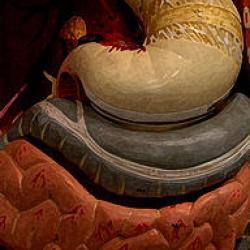Source Institutions
Source Institutions
Add to list Go to activity

In this chemistry activity, learners fill two test tubes with a solution of "artificial stomach fluid," consisting of hydrochloric acid in the same concentration as in human stomachs, some soap to create bubbles, and an acid base indicator. To one tube they add an antacid powder; in the other tube, they add an anti-gas powder. By observing the resulting reactions, learners observe how antacids and antigas medicines work on their stomach fluids. Cost estimates are per 100 learners. For safety reasons, this activity works best as a demonstration for younger audiences.
- 30 to 45 minutes
- 5 to 10 minutes
- $1 - $5 per group of students
- Ages 14 - adult
- Activity, Demonstration, Experiment/Lab Activity, Simulation
- English
Quick Guide
Materials List (per group of students)
- One 25-ml graduated cylinder
- Two plastic test tubes (about 100-ml) with screw caps
- Two small (about 4-oz) jars or containers with lids
- Two 1-ml or ¼-tsp measuring spoons
- One 250-ml squeeze bottle
- CaCO3 (calcium carbonate powder) (keep 500 g on hand)
- 1M HCl (hydrochloric acid) (keep 1 L on hand) — OR — concentrated (12M) HCl (keep 200 ml on hand)
- Dish-washing soap (keep 8 oz on hand)
- Bromocresol green solution (keep 50 ml on hand) — OR — bromphenol blue sodium salt (keep 10 g on hand)
- One 1000-ml glass bottle
- One large jar (500-ml) with lid
- One medium to large jar (250-ml or larger) with a lid
- One 50-ml bottle
- 30% simethicone emulsion (Dow-Corning® 7-9245, also known as polydimethylsiloxane) (keep 4 oz on hand) OR “SafeStepTM” de-icer (contains mostly KCl)
- in place of simethicone, potassium chloride (KCl) has been effective
Subjects
-
Life Sciences
-
Human Body
- Digestion
- Health and Nutrition
-
Human Body
-
Physical Sciences
-
Chemistry
- Chemical Reactions
- Acids and Bases
-
States of Matter
- Gases
-
Chemistry
Audience
To use this activity, learners need to:
- see
- see color
- read
- touch
Learning styles supported:
- Involves hands-on or lab activities
Other
Components that are part of this resource:
This resource is part of:
Access Rights:
- Free access
By:
Rights:
- All rights reserved, Oregon Museum of Science and Industry, 1997
Funding Source:
- National Science Foundation
